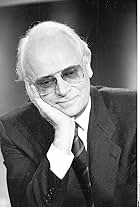Ephraim Kishon(1924-2005)
- Writer
- Director
- Actor
His father was the director of a bank. After graduating from high school, Hoffmann began studying art history and sculpture in Budapest. During the Nazi occupation of Hungary he was deported to Poland. From there he managed to escape and return to his homeland in an adventurous way before the end of the war in 1945. In 1949 he fled again, this time from Hungary to Israel. There he initially lived in a kibbutz, where he became familiar with the new language and developed his first literary activities, some of which already appeared in the daily press. Following the kibbutz experience, Kishon moved to Tel Aviv, where he continued writing and running a cabaret.
Kishon moved to Switzerland in the spring of 1981, where he lived for a short time in the canton of Appenzell and wrote his autobiography there. The writer's work consists primarily of satires that have been translated worldwide and have found an audience of millions in Germany since the beginning of the 1960s. His satirical plays "Der Blaumilchkanal" (1974) and "Es war die Lerche" (1977) were outstanding. Kishon also wrote the scripts for popular radio and television plays and occasionally directed them. In 1992, the German premiere of his comedy "Kein Wort zu Morgenstern" took place in St. Pölten under his direction. He also wrote and directed the comedy series "Sarah and Ephraim - Kishon's best family stories", which was shown on the private broadcaster Super-RTL in 1998. Kishon's other films included "Ervinka" and "Sleep Well, Sergeant".
There are also numerous film adaptations of the satirist's literary works. In political terms, Kishon repeatedly spoke out against anti-Israel campaigns and also against communism, which he took issue with in 1990 in "Ingratitude is the World's Wages". In 1997, his satirical novel "My Comb" conquered the international bestseller lists. After Kishon's second wife Sara Lipovitz died in 2002, he married the Austrian Lisa Witasek a year later for his third marriage. The writer had three children from his marriage to Sara. Kishon's literary life's work consisted of over 50 books that were translated into 37 languages. The worldwide circulation of his writings has already reached 43 million copies, with the German-language editions taking a top spot at 32 million.
The "Family Stories" are now considered the best-selling Hebrew book in the world - next to the Bible. Kishon was honored with numerous prizes such as the Order Against Animal Seriousness (1978), the Nobel Prize for Humor (1981) and the Karl Valentin Order (1984). In 1985 he received the Golden Camera. He went on to win three Golden Globes. A collection of political satires followed under the title Whoever believes it will be blessed (2000). In 2002, the State of Israel honored the writer with the Israel Prize, the country's highest honor, for his life's work. In the summer of 2004, on the occasion of Kishon's 80th birthday, the German publisher Langen Müller published the anniversary edition "All Novels", which includes Kishon's prose works.
Ephraim Kishon died on January 29, 2005 in Appenzell. He was buried in Tel Aviv.
Kishon moved to Switzerland in the spring of 1981, where he lived for a short time in the canton of Appenzell and wrote his autobiography there. The writer's work consists primarily of satires that have been translated worldwide and have found an audience of millions in Germany since the beginning of the 1960s. His satirical plays "Der Blaumilchkanal" (1974) and "Es war die Lerche" (1977) were outstanding. Kishon also wrote the scripts for popular radio and television plays and occasionally directed them. In 1992, the German premiere of his comedy "Kein Wort zu Morgenstern" took place in St. Pölten under his direction. He also wrote and directed the comedy series "Sarah and Ephraim - Kishon's best family stories", which was shown on the private broadcaster Super-RTL in 1998. Kishon's other films included "Ervinka" and "Sleep Well, Sergeant".
There are also numerous film adaptations of the satirist's literary works. In political terms, Kishon repeatedly spoke out against anti-Israel campaigns and also against communism, which he took issue with in 1990 in "Ingratitude is the World's Wages". In 1997, his satirical novel "My Comb" conquered the international bestseller lists. After Kishon's second wife Sara Lipovitz died in 2002, he married the Austrian Lisa Witasek a year later for his third marriage. The writer had three children from his marriage to Sara. Kishon's literary life's work consisted of over 50 books that were translated into 37 languages. The worldwide circulation of his writings has already reached 43 million copies, with the German-language editions taking a top spot at 32 million.
The "Family Stories" are now considered the best-selling Hebrew book in the world - next to the Bible. Kishon was honored with numerous prizes such as the Order Against Animal Seriousness (1978), the Nobel Prize for Humor (1981) and the Karl Valentin Order (1984). In 1985 he received the Golden Camera. He went on to win three Golden Globes. A collection of political satires followed under the title Whoever believes it will be blessed (2000). In 2002, the State of Israel honored the writer with the Israel Prize, the country's highest honor, for his life's work. In the summer of 2004, on the occasion of Kishon's 80th birthday, the German publisher Langen Müller published the anniversary edition "All Novels", which includes Kishon's prose works.
Ephraim Kishon died on January 29, 2005 in Appenzell. He was buried in Tel Aviv.












